
Podocarpus latifolius is a large evergreen tree up to 35 m high and 3 m trunk diameter, in the conifer family Podocarpaceae; it is the type species of the genus Podocarpus.
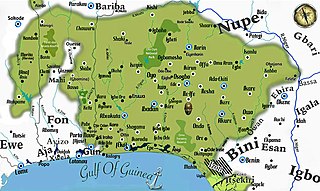
Yorubaland is the homeland and cultural region of the Yoruba people in West Africa. It spans the modern-day countries of Nigeria, Togo and Benin, and covers a total land area of 142,114 km2 or about 60% of the land area of Ghana. Of this land area, 106,016 km2 (74.6%) lies within Nigeria, 18.9% in Benin, and the remaining 6.5% is in Togo. Prior to European colonization, a portion of this area was known as Yoruba country. The geo-cultural space contains an estimated 55 million people, the majority of this population being ethnic Yorubas.
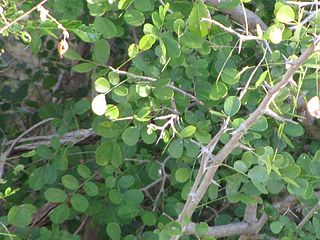
Dalbergia melanoxylon is a flowering plant in the family Fabaceae, native to seasonally dry regions of Africa from Senegal east to Eritrea and south to the north-eastern parts of South Africa. The tree is an important timber species in its native areas; it is used in the manufacture of musical instruments and fine furniture. Populations and genomic resources for genetic biodiversity maintenance in parts of its native range are threatened by overharvesting due to poor or absent conservation planning and by the species' low germination rates.
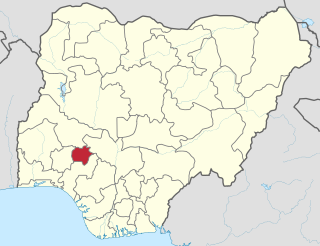
Ekiti State is a state in southwestern Nigeria, bordered to the north by Kwara State, to the northeast by Kogi State, to the south and southeast by Ondo State, and to the west by Osun State. Named for the Ekiti people—the Yoruba subgroup that make up the majority of the state's population—Ekiti State was formed from a part of Ondo State in 1996 and has its capital as the city of Ado-Ekiti.

Entandrophragma cylindricum is a tree of the genus Entandrophragma of the family Meliaceae. It is commonly known as sapele or sapelli or sapele mahogany, as well as aboudikro, assi, and muyovu.

Rosewood refers to any of a number of richly hued timbers, often brownish with darker veining, but found in many different hues.

Pericopsis elata is a species of flowering plant in the family Fabaceae and is known by the common names African teak, afromosia, afrormosia, kokrodua and assamela.

Podocarpus milanjianus is a species of conifer in the family Podocarpaceae. It is native to the highlands and mountains of tropical Africa.

Afzelia africana, the African mahogany, afzelia, lenke, lengue, apa, or doussi, is a tree species in the family Fabaceae.
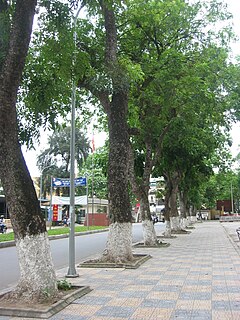
Khaya senegalensis is a species of tree in the Meliaceae family that is native to Africa. Common names include African mahogany, dry zone mahogany, Gambia mahogany, khaya wood, Senegal mahogany, cailcedrat, acajou, djalla, and bois rouge.

Nauclea diderrichii is a species of tree of the genus Nauclea in the family Rubiaceae. It is known by the common names bilinga, aloma, badi, kusia and opepe.
Terminalia ivorensis is a species of tree in the family Combretaceae, and is known by the common names of Ivory Coast almond, idigbo, black afara, framire and emeri.
Triplochiton is a genus of flowering plants in the family Malvaceae. It is a small genus of trees comprising tall tropical African trees with palmately lobed alternate leaves like those of the maple and being included in the Sterculiaceae subfamily of Malvaceae.
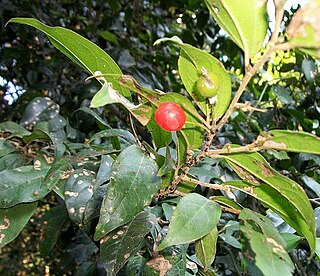
Celtis mildbraedii is a species of forest tree in the family Cannabaceae. It was previously assigned to the family Ulmaceae. These trees grow in limited areas of South Africa, Mozambique and Zimbabwe. They are also found in forested areas from West Africa to Sudan, DRC, Angola and Tanzania. Common names include natal white stinkwood, red-fruited white-stinkwood and natal elm. This species is more common in Tropical Africa than in Southern Africa.
The Okomu National Park, formerly the Okomu Wildlife Sanctuary, is a forest block within the 1,082 km2 (418 sq mi) Okomu Forest Reserve in the Ovia South-West Local Government Area of Edo State in Nigeria. The park is about 60 km (37 mi) north west of Benin City. The park holds a small fragment of the rich forest that once covered the region, and is the last habitat for many endangered species. It continues to shrink as villages encroach on it, and is now less than one third of its original size. Powerful corporations are involved in plantation development and logging concessions around the park, which also pose a threat.

Iroko is a large hardwood tree from the west coast of tropical Africa that can live up to 500 years. This is the common name for the genus Milicia, in which there are two recognized species, which are closely related: Milicia excelsa and Milicia regia.

Diospyros crassiflora, commonly known as Gabon ebony, African ebony, West African ebony, and Benin ebony is a species of lowland-rainforest tree in the family Ebenaceae that is endemic to Western Africa. It is named after the West African state of Gabon, though it also occurs in Cameroon, Central African Republic, Republic of the Congo, Democratic Republic of the Congo, Equatorial Guinea and Nigeria.

Apate terebrans, common names shot-hole borer or trunk borer or girdler, is a species of horned powder-post beetles belonging to the family Bostrichidae.


















